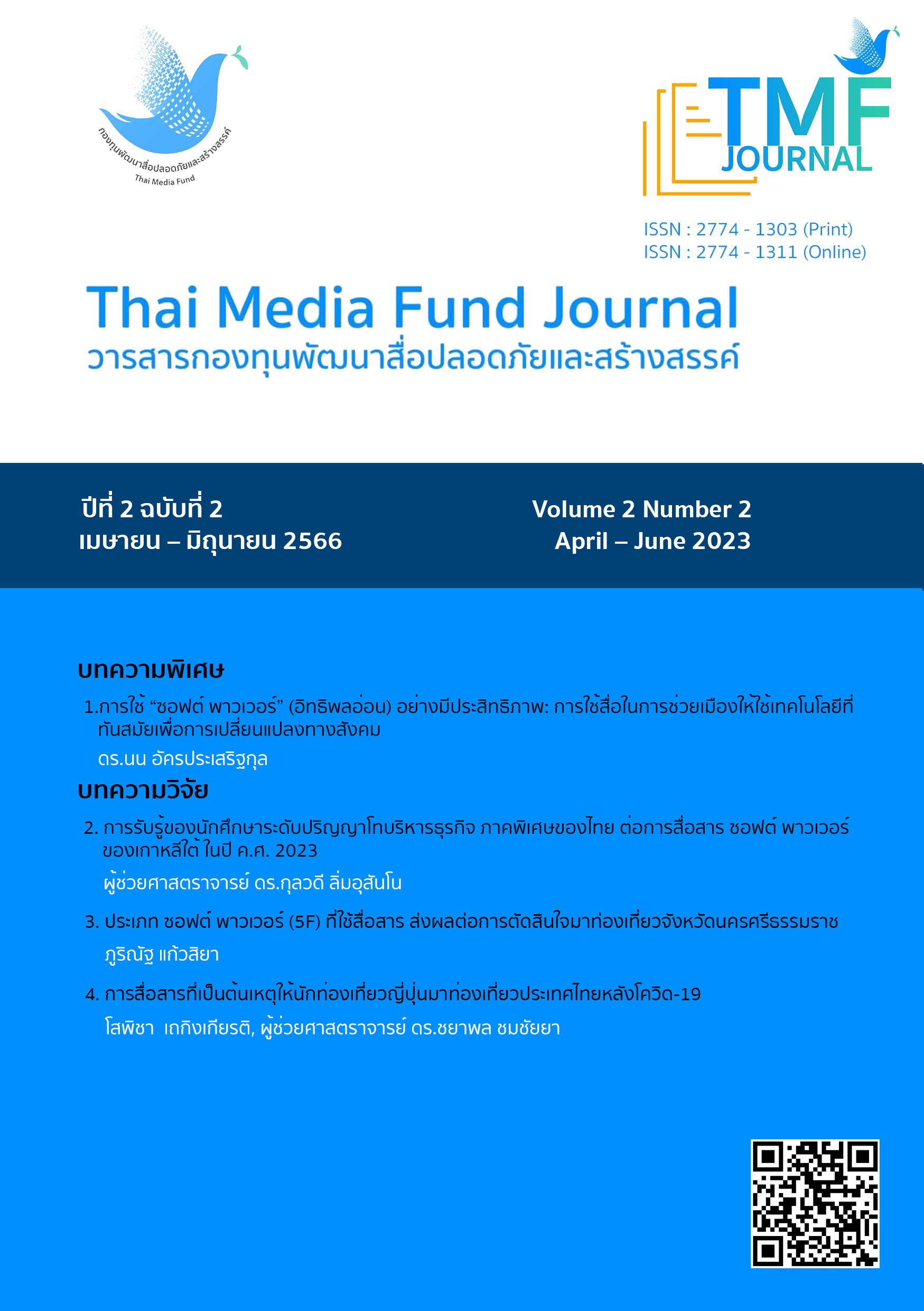การใช้ “ซอฟต์ พาวเวอร์”(อิทธิพลอ่อน) อย่างมีประสิทธิภาพ: การใช้สื่อในการช่วยเมืองให้ใช้เทคโนโลยีที่ทันสมัยเพื่อการเปลี่ยนแปลงทางสังคม
Main Article Content
บทคัดย่อ
Abstract
Smart cities are all the rage as governments and tech companies promise a dazzling future of innovation. But many initiatives end up as slogans rather than real solutions, failing to use technology to make people's lives better. What if we saw “smart cities” differently – as an opportunity to bring people together, meet local needs, and spread change that benefits more communities? This paper argues that cities and media can partner to develop smart cities as “effective soft power”: initiatives that directly improve lives, share knowledge for others to adapt, and spread benefits at scale. Media should report how technology helps real people in their neighborhoods. Show what's working and how others can achieve similar results. Ask hard questions about who's included and what's getting better. This challenges leaders to pursue smart cities that serve citizens first. Cities must focus on results, not hype. Work with communities to set priorities. Invest in programs that enhance sustainability and equity. And share frameworks, data, and tools so more places can succeed. By listening to people and measuring actual progress, cities gain credibility and influence. Together, media and cities can transform “smart cities” into a movement that matters: one where technology and governance enhance wellbeing through cooperation on shared interests where people enjoy quality of life improvements and participate in future-building. This paper shares a vision for how we can all help turn “smart cities” into “effective soft power” that benefits society. By focusing on people, progress and partnership with shared aims, smart cities become a catalyst for change that matters.
Article Details

อนุญาตภายใต้เงื่อนไข Creative Commons Attribution-NonCommercial-NoDerivatives 4.0 International License.
เอกสารอ้างอิง
Work Cited:
Angelidou, M. (2014). Smart city policies: A spatial approach. Cities, 41, S3-S11.
Bangkok Post (2020, October 31) Korean smart city centre to support investment. https://www.bangkokpost.com/business/2011547/korean-smart-city-centre-to-support-investment.
Crumpton, C. D., Wongthanavasu, S., Kamnuansilpa, P., Draper, J., & Bialobrzeski, E. (2021). Assessing the ASEAN smart cities network (ASCN) via the quintuple helix innovation framework, with special regard to smart city discourse, civil participation, and environmental performance. International Journal of Urban Sustainable Development, 13(1), 97-116.
Datta, A., & Odendaal, N. (2019). Smart cities and the banality of power. Environment and Planning D: Society and Space, 37(3), 387-392.
Fernandez-Anez, V., Fernández-Güell, J. M., & Giffinger, R. (2018). Smart City implementation and discourses: An integrated conceptual model. The case of Vienna. Cities, 78, 4-16.
Ha, H. T., & Ong, G. (2020). Assessing the ROK’s New Southern Policy towards ASEAN. ISEAS Perspective, 7, 7-9.
Jutamas Kaewsuk and Chochoe Deveporihartakula (2022). Voluntary Local Review 2022: The Implementation of the UN Sustainable Development Goals in Nakhon Si Thammarat City Municipality. NST City and United Nations Economic and Social Commission for Asia and the Pacific (ESCAP)
Khan, H. H., Malik, M. N., Zafar, R., Goni, F. A., Chofreh, A. G., Klemeš, J. J., & Alotaibi, Y. (2020). Challenges for sustainable smart city development: A conceptual framework. Sustainable Development, 28(5), 1507-1518.
Kshetri, N., Alcantara, L. L., & Park, Y. (2014). Development of a smart city and its adoption and acceptance: the case of new songdo. Communications & Strategies, (96), 113-129
Kumar, N. M., Goel, S., & Mallick, P. K. (2018). Smart cities in India: Features, policies, current status, and challenges. 2018 Technologies for Smart-City Energy Security and Power (ICSESP), 1-4.
Nuttapon Nimmanphatcharin, Passakon Prathombutr, Supakorn Siddhichai, Non Arkaraprasertkul and Wichai Treethidtaphat (2020). “Smart City Initiatives in Thailand: Key Concepts and Methods.” Hitachi Review 70: 106 – 110.
Non Naprathansuk (2017). A National Pilot Project on Smart City Policy in Thailand: a Case Study on Phuket Khon Kaen Chiangmai Province. European Journal of Multidisciplinary Studies, 2(6), 337-346.
Non Arkaraprasertkul (2022, April 13). Why do we need smart(er) cities and how to build oneThe Smart City Primer. Medium. https://medium.com/user-experience-design-1/the-smart-city-primer-e4c4b7715819
Nye, J. S. (1990). “Soft Power.” Foreign policy, (80), 153-171.
Noori, N., Hoppe, T., & de Jong, M. (2020). Classifying pathways for smart city development: Comparing design, governance and implementation in Amsterdam, Barcelona, Dubai, and Abu Dhabi. Sustainability, 12(10), 4030.
Kasititorn Poopraradai, Passakon Prathombutr, Supakorn Siddhichai, Kasama Kongsmak, Monsak Socharoentum (2019). ASCN2019: ASEAN Smart Cities Network Advancing Partnership for Sustainability. Digital Economy Promotion Agency
Rana, N. P., Luthra, S., Mangla, S. K., Islam, R., Roderick, S., & Dwivedi, Y. K. (2019). Barriers to the development of smart cities in Indian context. Information Systems Frontiers, 21, 503-525.
Rubenstein, J. (2016). “The Lessons of Effective Altruism.” Ethics & International Affairs, 30(4), 511-526. doi:10.1017/S0892679416000484
Szalai, J. (2022, December 9). How Sam Bankman-Fried Put Effective Altruism on the DefensiveThe New York Times. https://www.nytimes.com/2022/12/09/books/review/effective-altruism-sam-bankman-fried-crypto.html
Tan, S. Y., Taeihagh, A., & Sha, K. (2021). How transboundary learning occurs: case study of the ASEAN smart cities network (ASCN). Sustainability, 13(11), 6502.
The ASEAN Secretariat (2019, August 23) ASCN reviews work on smart cities. https://asean.org/ascn-reviews-work-on-smart-cities/
Townsend, A. M. (2013). Smart cities: Big data, civic hackers, and the quest for a new utopia. WW Norton & Company.
Wirtz, B. W., Müller, W. M., & Schmidt, F. (2020). Public smart service provision in smart cities: A case-study-based approach. International Journal of Public Administration, 43(6), 499-516.


